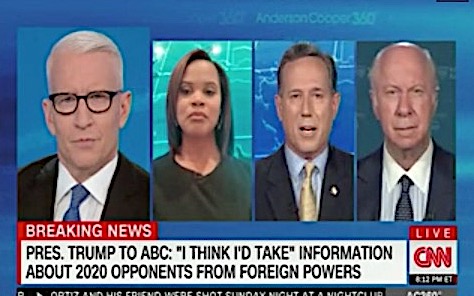Rick Santorum mounts a linguistic defense of Trump's foreign election help comments to skeptical CNN panel


A free daily email with the biggest news stories of the day – and the best features from TheWeek.com
You are now subscribed
Your newsletter sign-up was successful
President Trump's statement that he would accept "oppo research" on a political opponent from a foreign government and would "maybe" tell the FBI was jarring to most observers, even if they found it in character for Trump. Longtime presidential adviser David Gergen told CNN's Anderson Cooper eh was "shocked but not surprised" by Trump's comments, adding that legally, Trump or anyone else in the government with a top security clearance, has "an affirmative obligation to call the FBI" if a foreign government, especially an adversarial one, "approaches you with information like this." In fact, he added, "it would be breaking the law not to call them."
Resident Trump supporter Rick Santorum pointed out that Trump said he would both "listen" to the opposition research from a foreign government and call the FBI, and when Gergen and Cooper noted that Trump said "maybe" and contradicted his FBI director's directive to alert authorities, Santorum called "maybe" just one of Trump's "filler words," said Trump's language is often "imprecise," and said he doesn't "think there's a crime in looking at the information as long as you refer it to the proper authorities."
Laura Coates, a former federal prosecutor and current CNN legal analyst, wasn't having it. Watch below. Peter Weber
The Week
Escape your echo chamber. Get the facts behind the news, plus analysis from multiple perspectives.

Sign up for The Week's Free Newsletters
From our morning news briefing to a weekly Good News Newsletter, get the best of The Week delivered directly to your inbox.
From our morning news briefing to a weekly Good News Newsletter, get the best of The Week delivered directly to your inbox.
A free daily email with the biggest news stories of the day – and the best features from TheWeek.com
Peter has worked as a news and culture writer and editor at The Week since the site's launch in 2008. He covers politics, world affairs, religion and cultural currents. His journalism career began as a copy editor at a financial newswire and has included editorial positions at The New York Times Magazine, Facts on File, and Oregon State University.
-
 The mystery of flight MH370
The mystery of flight MH370The Explainer In 2014, the passenger plane vanished without trace. Twelve years on, a new operation is under way to find the wreckage of the doomed airliner
-
 5 royally funny cartoons about the former prince Andrew’s arrest
5 royally funny cartoons about the former prince Andrew’s arrestCartoons Artists take on falling from grace, kingly manners, and more
-
 The identical twins derailing a French murder trial
The identical twins derailing a French murder trialUnder The Radar Police are unable to tell which suspect’s DNA is on the weapon
-
 Labor secretary’s husband barred amid assault probe
Labor secretary’s husband barred amid assault probeSpeed Read Shawn DeRemer, the husband of Labor Secretary Lori Chavez-DeRemer, has been accused of sexual assault
-
 Trump touts pledges at 1st Board of Peace meeting
Trump touts pledges at 1st Board of Peace meetingSpeed Read At the inaugural meeting, the president announced nine countries have agreed to pledge a combined $7 billion for a Gaza relief package
-
 NIH director Bhattacharya tapped as acting CDC head
NIH director Bhattacharya tapped as acting CDC headSpeed Read Jay Bhattacharya, a critic of the CDC’s Covid-19 response, will now lead the Centers for Disease Control and Prevention
-
 Witkoff and Kushner tackle Ukraine, Iran in Geneva
Witkoff and Kushner tackle Ukraine, Iran in GenevaSpeed Read Steve Witkoff and Jared Kushner held negotiations aimed at securing a nuclear deal with Iran and an end to Russia’s war in Ukraine
-
 Pentagon spokesperson forced out as DHS’s resigns
Pentagon spokesperson forced out as DHS’s resignsSpeed Read Senior military adviser Col. David Butler was fired by Pete Hegseth and Homeland Security spokesperson Tricia McLaughlin is resigning
-
 Judge orders Washington slavery exhibit restored
Judge orders Washington slavery exhibit restoredSpeed Read The Trump administration took down displays about slavery at the President’s House Site in Philadelphia
-
 Hyatt chair joins growing list of Epstein files losers
Hyatt chair joins growing list of Epstein files losersSpeed Read Thomas Pritzker stepped down as executive chair of the Hyatt Hotels Corporation over his ties with Jeffrey Epstein and Ghislaine Maxwell
-
 Judge blocks Hegseth from punishing Kelly over video
Judge blocks Hegseth from punishing Kelly over videoSpeed Read Defense Secretary Pete Hegseth pushed for the senator to be demoted over a video in which he reminds military officials they should refuse illegal orders
